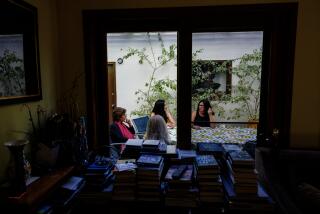ELECTION PREVIEW : Campaigns Reflecting Tough Times in City That’s Known for Affluence : * Nine-candidate field is the largest in recent memory. Each has agreed on a $50,000 spending cap. School funding and crime are among the top issues.
- Share via
BEVERLY HILLS — Nine candidates have filed to run for City Council in Beverly Hills, the largest field in recent memory.
And despite the city’s reputation as a haven for the rich, the three incumbents and six challengers touched on the same problems that worry everybody else: crime, traffic and a decline in funding for the schools.
All three incumbents are seeking a second term: Vicki Reynolds, 56, now the mayor; Allan L. Alexander, 51, a land-use attorney who served as mayor from 1990 to 1991, and Bernard J. Hecht, the retired owner of a trucking and warehouse company. Hecht, 69, is in line to take his turn as mayor if he wins reelection.
The challengers for the three open seats include retired executive Herm Shultz, 69, who left his position as president of Concern for Tenants Rights to join the race. Shultz said he wanted to avoid a conflict of interest between the renters group and his political campaign.
Renters make up 57% of the city’s population, according to the 1990 U.S. Census.
Other hopefuls who filed for the April 14 election include Salvatore W. Di Salvo, 64, an insurance broker; James E. Fabe, 39, a dentist; Martin Halfon, 33, a real estate developer; Dean Lavine, 20, a college student, and Thomas S. Levyn, 42, an attorney.
One of the most colorful candidates, Catherine (Kaye) Coleman, the chief waitress at Nate and Al’s deli, dropped out of the race Wednesday morning.
Coleman, who volunteers at Cedars-Sinai Medical Center and cares for a sick husband, realized that she would not have enough to time to campaign or to serve if elected, said Merritt Coleman, her campaign manager and stepson.
The 57-year-old waitress once appeared in her deli uniform--”without the grease stains”--to introduce Chuck Barris on The Gong Show.
At a meeting sponsored by the League of Women Voters last weekend, the candidates agreed to a $50,000 spending cap for the campaign.
This is a reflection of tough times even in Beverly Hills, where four years ago Hecht topped the spending charts with an outlay of $105,698 for literature, advertising, lawn signs and other costs, an investment that worked out to $32.30 a vote.
“In an economic recession when cutbacks are the order of the day, it would simply be wrong to escalate spending on a political campaign,” said Reynolds, who spent $89,794 in her first race four years ago.
As mayor, she said in her sample ballot statement, she oversaw a balanced budget in which police and fire spending was maintained while funding for the schools was increased.
“I am dedicated to preserving the residential character of our neighborhoods, encouraging a healthy economic base for our municipal services and providing the best and highest quality of life,” she said.
Alexander, who served on the Planning Commission for five years before his election in 1988, is a Harvard Law School graduate and Peace Corps veteran.
During his term on the City Council, he said, “I have instituted measures to protect residential neighborhoods from overdevelopment, traffic and non-residential parking.”
Hecht, with more than 40 years of management experience, pledged to “continue to support our police, fire and safety programs and our schools, and to manage Beverly Hills like a business whose bottom line is the well-being of all its residents.”
The themes of crime, traffic and schools were touched on by challengers as well, although some appealed to individual neighborhood interests.
“I have attended almost every study session and regular session for at least four years, which enables me to have as close a feel for what is going on in Beverly Hills as anyone while not actually sitting on the City Council,” said Di Salvo, who sits on the board of the Municipal League, a citywide residents group.
“Beverly Hills needs new energy, better representation,” said Fabe, who listed himself as an economist as well as a dentist. “Forty percent of our population lives southeast of City Hall, yet no council members live there. I live there, and pledge to represent my neighbors as well as the interests of Beverly Hills at large.”
Halfon, a resident for 26 years, said: “On our streets, where we once felt safe, we have begun to feel uneasy; in our schools, where we once felt pride, we have begun to feel doubt; in our business community, where we once shared an unbridled sense of hope, we have begun to feel uncertainty. We can simply no longer return incumbents . . . who share a big measure of responsibility for the mistakes we, as a community, have taken.”
Lavine, a student at Santa Monica College, claimed the “energy and flexibility” of youth and said, “We must protect ourselves from the environmental and traffic impact from Los Angeles’ growth at Beverly Hills’ expense.”
Levyn, a member of the board of the Beverly Hills Education Foundation, said: “We must say ‘no more’ to a Beverly Hills City Council which refuses to embrace sound economic policies and which neglects to recognize that even in Beverly Hills we must ‘save for a rainy day.’ ”
More to Read
Sign up for Essential California
The most important California stories and recommendations in your inbox every morning.
You may occasionally receive promotional content from the Los Angeles Times.













